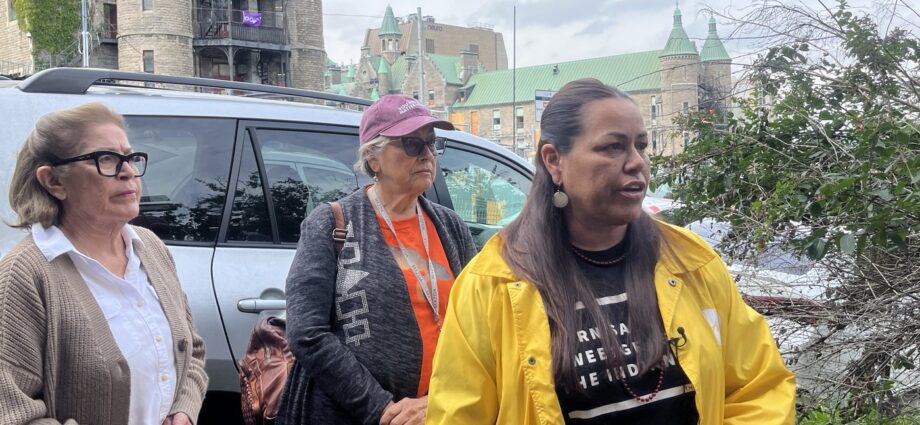
By Marcus Bankuti, Local Journalism Initiative Reporter, The Eastern Door
September 15, 2023
The Kanien’kehá:ka Kahnistensera (Mohawk Mothers) dragged McGill University and the Societe quebecoise des infrastructures (SQI) back to court Thursday after work resumed on the Royal Victoria Hospital site this week.
The Kahnistensera filed an emergency motion at Quebec’s Superior Court seeking a halt, arguing that the investigation should be completed prior to construction work being performed and accusing the institutions of violating the spirit of a settlement agreement that was finalized in April.
A decision on the emergency motion filed by the Kahnistensera is expected Monday.
“I say look at it from an Onkwehón:we perspective, which is just the truth. That’s all that we want here,” said Kwetiio, one of the Kahnistensera, on Tuesday outside the Royal Vic, where excavation was taking place this week for the revitalization of the site.
The situation is the latest in a lengthy battle, led by the Kahnistensera, to investigate whether there are unmarked burials of children on the site, which once housed the Allan Memorial Institute psychiatric facility, where Indigenous patients were experimented upon as part of in the 1950s and 60s.
Lana Ponting, who was unlawfully detained at the institute as a teenager in the 1950s, has testified to the abuses perpetrated against Indigenous people there and her belief that there are Indigenous people buried on the grounds.
“We need to find them. We need to find out the truth. We need to find out who’s responsible,” Kwetiio said Tuesday.
Indigenous children from residential schools were also sent to the Royal Victoria Hospital, as has been pointed out by Kimberly Murray, the independent special interlocutor for missing children and unmarked graves and burial sites associated with Indian residential schools, who has been involved in hearings as a third-party intervenor.
The $850-million redevelopment project had previously been stopped by an injunction that was granted in October 2022, paving the way for the settlement agreement.
McGill sent out multiple emails to staff and students this week justifying the decision to proceed with the work and asserting that no evidence of human remains has been produced by the initial phase of investigation.
However, the Kahnistensera contend that a number of anomalies should prohibit the excavation and that the work is a “serious provocation.” They characterize McGill and the SQI as having wrested away control of the investigation and disbanding a panel of archeologists agreed upon by the parties, a charge the university denies.
“The work is being carried out because it’s in alignment with the agreement,” said Angela Campbell, deputy provost, equity and academic policies at McGill, when asked about why the university opted to move ahead with work before the completion of the investigation despite the sensitivity of the issue.
The agreement indicates that if “no graves are identified in a given area” that “excavation work can begin on a rolling basis” with cultural monitoring.
“I think we all understand the gravity of the issues in play here. Unmarked burials is something that no one takes lightly,” said Campbell.
She insists this seriousness was at top of mind for all parties when the agreement was made and denied that this has been violated, saying different techniques are to be employed in different areas according to expert input.
McGill’s lawyer, Doug Mitchell, argued in court Thursday that the Kahnistensera are attempting to modify the agreement with their motion.
One of the main objections the Kahnistensera have expressed relates to the scent of human remains being detected by trained dogs in June – the radius of the finding includes buildings, the grounds of which have not been searched.
“In their report, the panel of archeologists never recommended to go inside the buildings,” said Pierre Major, executive director of the New Vic Project.
“We’ve not been allowed to go in,” said Kwetiio, outraged that these sections have not been investigated.
Major suggested that the excavation for construction could advance the investigation. “The best way to get to the truth is to do the work,” he said.
The Kahnistensera have also been incensed by the reappearance of a security guard working for the Commissionaires who harassed them. The employee was captured on video saying to the Mothers, “Go and get a life, go get a husband … go have some kids, get yourselves a life because I think you don’t have lives.”
While the Kahnistensera were promised this person was permanently removed, the guard was back at the site over the weekend, which McGill did not contest.
“When we found that out, we were very frustrated and couldn’t believe it,” said Campbell, who said the guard was on a section of the site controlled by the McGill University Hospital Centre (MUHC), which is distinct from the university.
“You know what sorry means to me?” said Kwetiio. “Sorry means you feel so bad you’re never going to do it again. Those same people are on the site.”
She named this as one reason they don’t feel safe monitoring the site, as they have the right to do, in addition to a lack of training and proper equipment.
“I’m very confident,” said Kwetiio ahead of the hearing. “Me and these Kahnistensera, we’re getting this done all the way to the end.
“For this long they tried to get rid of us, but we’re still here,” she said.
Kahentinetha, another of the Kahnistensera, suggested the Mothers will turn to international arbiters if Canadian courts do not intervene.
“We’re doing the right thing,” she said.
“The time will come when it has to go further.”
gmbankuti@gmail.com
Subscribe to our newsletter.


